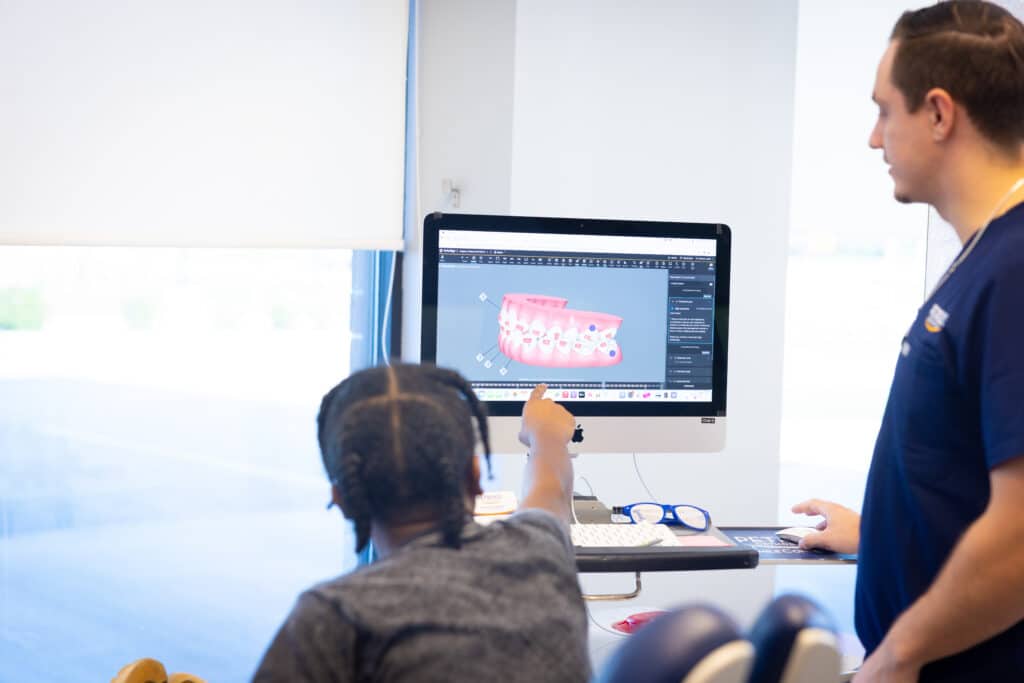Do you wake up with a sore jaw or headache? Do your teeth seem sensitive? Have you noticed cracks or chips in your teeth? These could all be signs of bruxism, also known as teeth grinding. This can seriously damage your smile, but orthodontic treatment for bruxism can save it!
Petrous Orthodontics has several options to help stop your teeth grinding and save your smile. You may need recommendations for a good night guard, or you may require treatment with braces or Invisalign to address the issue. Whatever you need, we can develop a plan to help you stop grinding your teeth and preserve your smile.
What Is Bruxism?
What is bruxism? It’s a term used to describe both teeth grinding and jaw clenching, which can occur subconsciously, during sleep, or even while awake. While many people grind their teeth during sleep, others may do so during the day without even realizing it.
If you're wondering whether you have bruxism, there are several symptoms to look out for:

Any or all of these symptoms may indicate that you have bruxism. If so, you should address it as soon as possible. The longer you go with bruxism, the more damage you will do to your teeth and jaws.
Causes of Bruxism
What are the causes of bruxism? Several factors have been linked to teeth grinding, including stress and malocclusion (misaligned teeth). Children and adults may grind their teeth for different reasons.
For children, bruxism is often linked to oral discomfort, such as teething or issues with teeth alignment. In some cases, it may also be a reflexive response to breathing problems like those caused by allergies. Fortunately, many children outgrow bruxism over time.
Adults grind their teeth for different reasons. Aside from stress, factors such as alcohol or caffeine consumption, smoking, and certain medications (like anti-anxiety drugs or selective serotonin reuptake inhibitors, SSRIs) can contribute. Excessive gum chewing, cheek biting, or other repetitive jaw movements may also cause bruxism.
Physical issues can also cause bruxism in adults, including sleep apnea, gastrointestinal disorders, dementia, and Parkinson’s Disease. Another common link is malocclusion, which can be both a cause and a result of bruxism.
Treating these underlying issues—whether through stress reduction techniques, eliminating stimulants like caffeine and alcohol, quitting smoking, or discussing medication changes with your doctor—can help reduce or eliminate bruxism.
Bruxism Treatment With Night Guards
Teeth grinding is a tough habit to break, but a night guard can provide some relief. One effective treatment for bruxism is the use of a night guard. This device is different from the mouth guard you might use for sports. Night guards are typically made of clear acrylic and are thinner than sports guards. Some may even have holes in the front to help with breathing.
How do you get a night guard for teeth grinding? Some dentists offer professional-grade night guards tailored specifically to your mouth. Alternatively, we can recommend a boil-and-bite device. These are molded to your teeth at home by heating them, biting into them, and then cooling them to set the shape.
For the best fit and most protection, we always recommend a professional-grade night guard, especially if you have significant grinding or TMJ symptoms.

Bruxism Treatment With Orthodontics
Can braces help with teeth grinding? Absolutely! Some people grind their teeth because their teeth aren’t properly aligned. Orthodontics can correct these misalignments, which can reduce or even eliminate bruxism. In fact, for patients with TMJ issues caused by bruxism, orthodontic treatment often plays a key role in managing and alleviating symptoms.
Braces or Invisalign can help realign your teeth and jaw, so they sit in their proper position and relax naturally, which reduces the unconscious need to grind your teeth. Braces move your teeth into alignment, while other devices like rubber bands can accelerate the process, especially if your jaw also needs adjustment.
Bruxism can also worsen malocclusion over time, so orthodontic treatment not only helps with teeth grinding but can also repair some of the damage done by grinding.
Orthodontic treatment is a great way to help break your teeth-grinding habit and prevent further damage to your teeth and jaws!
Bruxism Treatment in Royal Oak, MI
Grinding your teeth can cause significant damage to both your teeth and your jaw. It can lead to broken teeth and cause significant pain and discomfort.
In some cases, bruxism can be reduced with relaxation techniques or a reduction in stimulants such as caffeine and nicotine. If those methods don’t work, orthodontic treatment may be the solution.
Petrous Orthodontics is here to help if you need bruxism treatment in Royal Oak, MI. Schedule an appointment with us, and we can determine whether orthodontic treatment can help end your bruxism.
 Home
Home